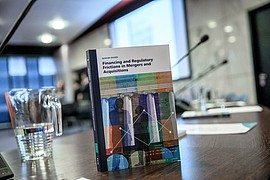PhD Defence: Eden Zhang

In her dissertation ‘Financing and Regulatory Frictions in Mergers and Acquisitions’, ERIM’s Eden Zhang studies how financial frictions and regulatory costs affect mergers and acquisitions (M&A).
Eden Zhang defended her dissertation in the Senate Hall at Erasmus University Rotterdam on Thursday, 11 January 2017 at 13:30. Her supervisors were Prof. Peter Roosenboom and Prof. Abe de Jong. Other members of the Doctoral Committee are Prof. David Yermack (NYU Stern), Prof. Wolf Wagner (RSM) and Prof. Patrick Verwijmeren (EUR).
About Eden Zhang

Quxian Zhang (Eden) was born in Hunan, China in 1986. She obtained her bachelor degree in finance from Tsinghua University in Beijing in 2008. After working as a research assistant at Hong Kong University of Technology and Science, she began her post-graduate studies at University of Texas at Dallas and obtained a Master of Science in Finance degree. In 2012, Eden started her doctoral studies at Rotterdam School of Management, Erasmus University under the supervision of Professor Peter Roosenboom. Her PhD project focuses on empirical corporate finance and political economy of finance. In the third year of her PhD program, Eden went on a research visit to NYU Stern School of Business, hosted by Professor David Yermack. She presented her research work at several international conferences and research seminars. As of July 1, 2017, Eden works as Lecturer at Monash University, Melbourne, Australia.
Thesis Abstract

This dissertation studies how financial frictions and regulatory costs affect mergers and acquisitions (M&A). The first conclusion is that financial distress drives firms to make diversifying acquisitions. Acquisitions made by distressed firms in recent years are economically important. Exploiting a natural experiment, this thesis identifies the causal link between financial distress and acquisitions. The evidence shows that distressed firms acquire to diversify bankruptcy risk, rather than to capture external growth opportunities and revive growth. The second conclusion of the dissertation is that political connections of banks affect the government auctions of distressed banks during the Great Recession. Lobbying financial regulators significantly increases a bidding bank’s probability of winning. The post-acquisition operating performance is worse for lobbying acquirers than for their non-lobbying counterparts, suggesting that lobbying results in a less efficient allocation of failed banks. The results provide new insights into the bank resolution process and its political economy. Thirdly, the dissertation shows that the regulatory review process for M&As poses significant costs and risk for merging firms. An adverse antitrust review outcome reduces shareholder wealth and the probability of deal success. Mitigating such risk via lobbying may benefit shareholders. Consistently, acquirers strategically adjust lobbying expenditures around the merger announcement. The results highlight the role of political connections in corporate investments under regulatory uncertainty.
Photos: Chris Gorzeman / Capital Images


